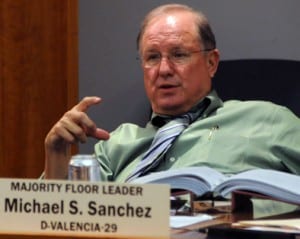
Heath Haussamen / NMPolitics.net
Senate Majority Leader Michael Sanchez (Photo by Heath Haussamen)
Senate majority leader decides which bills get floor hearings and which don’t. Among those watching intently is Gov. Susana Martinez, who has complained that Sanchez is “holding back” her bills.
In 2009, Attorney General Gary King complained during a speech about Senate Majority Leader Michael Sanchez not calling up a bill he was pushing for a vote.
Speaking about the bill, which sought to limit the possession of pseudoephedrine, King said, “We got that all the way through the Legislature… but we got it to the floor of the Senate and could not get it brought up for a vote.”
King encouraged those to whom he was speaking to contact their senators, “and specifically to talk to the majority leader, to Michael Sanchez, and make sure that he understands when they’re setting priorities in the Senate that last week, that they should look at bills like this one.”
King singled out the majority leader because Sanchez, and Sanchez alone, controls the Senate floor calendar. He decides when – or if – bills get called up for debate. That’s what makes the Belen Democrat one of the most powerful officials in Santa Fe.
Sanchez’s power becomes particularly important in these final days of the session, when the list of bills on the calendar grows long (today it includes more than 150 bills). By the last hour of the session – 11 a.m. to noon on Saturday – it’s common for all eyes to be on Sanchez as time runs short and he decides which bills die without a Senate floor vote.
Those watching intently include Gov. Susana Martinez, who, with the possible exception of the film incentive compromise, hasn’t yet had a single item on her legislative agenda make it through both chambers and to her desk. She complained about that last week.
“I think you need to ask Sen. Michael Sanchez as to why he is holding back the bills that need to be discussed on the Senate floor, because they, some of them, have been there for a week,” Martinez said at a news conference.
“I’m going to continue to work with him, and continue to work with the Senate,” she said. “But they need to start moving those bills along.”
After weeks of building tension between the Senate and governor over her webcasting and heavy lobbying, those remarks prompted a harsh response from Sanchez, who said in a news release that Martinez’s “background as a prosecutor has not given her practical experience or any idea of governing and how the legislative process works, including the detailed efforts required for shaping legislation.”
“Rather than tying up valuable legislative time on divisive issues, Gov. Martinez needs to get out of campaign mode and get down to the business of governing and working with the Legislature to create a comprehensive plan for the future,” he said. “I would encourage the governor to focus her energy on solving problems instead of merely exploiting them for partisan political purposes.”
‘Compromise is not a dirty word’
Sanchez appears to be fed up with the way Martinez has approached policymaking during her first session as governor. In response to questions submitted by NMPolitics.net, he said Martinez’s prior experience as Doña Ana County’s district attorney “includes presenting matters to grand juries in secrecy where only one side of the issue is presented.”
“That approach differs from our open and democratic process of governance that seeks to make reasoned and informed decisions by gathering input from all affected parties and interests,” Sanchez said. “This assures transparency and deliberate debate of the issues before us.”
Sanchez had some advice for the governor: “Find common ground, develop consensus and compromise to advance programs to solve the serious problems we all face.”
“It’s time to stop campaigning and start governing,” Sanchez said. “Divide and conquer may be a maxim of warfare, but unite and lead is what all of us should be trying to accomplish. Compromise is not a dirty word, as some would have you believe.”
Sanchez also said he believes most of Martinez’s bills “have a chance” of being approved by the Legislature before the session ends, “but not necessarily in the form she proposed.”
For example, he pointed to House Bill 78. Martinez wants the bill to repeal a law that allows undocumented immigrants to obtain driver’s licenses, and the House passed such a version. The Senate amended the bill to continue to allow undocumented immigrants to obtain licenses but place more requirements on them. The chambers have not yet resolved their differences.
Sanchez’s statement about most of Martinez’s measures making it to her desk, but not necessarily in the form she proposed, is certain to upset the governor. She has already pledged to veto the Senate version of HB 78 if that’s what comes to her desk.
Martinez declined to comment for this article.
Bad blood goes back to Baby Brianna bill

Susana Martinez
Even before this session – and before she ran for governor – Martinez had no love for Sanchez. As I’ve written before, the bad blood goes back to 2005, when Martinez, as district attorney, was lobbying for tougher penalties for fatal child abuse.
The Baby Brianna bill, named after a five-month-old child killed in Doña Ana County, made it to the Senate floor before Sanchez made claims about it that weren’t true. He argued that parents could be prosecuted under the law if a child was hurt or killed in an accident or abused without their knowledge.
Based on that claim, Sanchez pushed through a floor amendment that weakened penalties for child abuse resulting in permanent injury. So a bill that was designed to toughen penalties for fatal child abuse would have also weakened penalties for another type of child abuse.
Martinez was infuriated and started working behind the scenes to combat Sanchez’s amendment. She contacted me about writing an article.
I did. My article quoted Martinez and an AG spokesman as saying that Sanchez’s claim was false. Specific wording in the bill, the AG’s office told me, prevented prosecution of parents whose children were hurt or killed in accidents or without their knowledge.
In the article Martinez also accused Sanchez, a lawyer who does criminal defense work, and Sen. Cisco McSorley, another lawyer who argued for the weakened penalties, of manipulating colleagues who weren’t lawyers and didn’t know any better. She questioned whether the two were working for their constituents or clients.
Copies of my article ended up on lawmakers’ desks. Some behind-the-scenes wrangling by State Rep. Joseph Cervantes and then-Gov. Bill Richardson breathed new life into the bill and got Sanchez out of the way. Sanchez’s amendment was removed before the bill passed and was signed into law.
Emotions don’t affect Senate calendar, Sanchez says
Martinez has a long memory, and many say she holds grudges. She has been implicitly threatening all session that she will try to defeat lawmakers in the 2012 election who hold up her agenda.
Sanchez currently sits at the top of the list of people who are in her way, and there’s a chance he will face a tough general-election challenge next year, with Martinez heavily backing his opponent.
Do such threats influence Sanchez’s decisions on what legislation gets a floor hearing? Is he less likely to call Martinez-backed bills up for debate? Sanchez said the answer is no.
“Even though this is a political process, we try to do what is in the best interest of the citizens of New Mexico, disregarding political attacks from all sides, including the governor,” he said. “My preference over the years has been to work with governors and avoid emotional reactions: They don’t play a role in deciding which bills I place on the calendar.”
Then how does he decide which bills get a hearing?
“I do this in consultation with bill sponsors and majority and minority party members,” he said. “I also rely upon my years of experience in dealing with legislative matters and lawmakers.”
“I weigh the complexity of the bill and review the debate it created in committee, which often indicates how much debate it will generate on the floor,” Sanchez said. “My goal is to balance the flow of Democrat and Republican bills through the process.”
